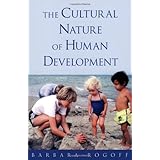
Average Reviews:

(More customer reviews)Rogoff's acclaimed concepts about how human development and culture naturally intertwine unfold in a highly intricate matter within this text.
Like Jerome Bruner, her prose can overpopulate itself with too many techy terms for the average educator; however, if you can push through the woods of her thick style, you will uncover many truths about culture.
As she puts forth, culture springs from the natural progression of social history and interaction. Each culture possesses its own scripts and nuances on what exists as "typical" development.
I invite anyone to delve into her mind.
Click Here to see more reviews about: The Cultural Nature of Human Development
Three-year-old Kwara'ae children in Oceania act as caregivers of their younger siblings, but in the UK, it is an offense to leave a child under age 14 ears without adult supervision. In the Efe community in Zaire, infants routinely use machetes with safety and some skill, although U.S. middle-class adults often do not trust young children with knives. What explains these marked differences in the capabilities of these children?Until recently, traditional understandings of human development held that a child's development is universal and that children have characteristics and skills that develop independently of cultural processes. Barbara Rogoff argues, however, that human development must be understood as a cultural process, not simply a biological or psychological one. Individuals develop as members of a community, and their development can only be fully understood by examining the practices and circumstances of their communities.
Click here for more information about The Cultural Nature of Human Development

0 comments:
Post a Comment